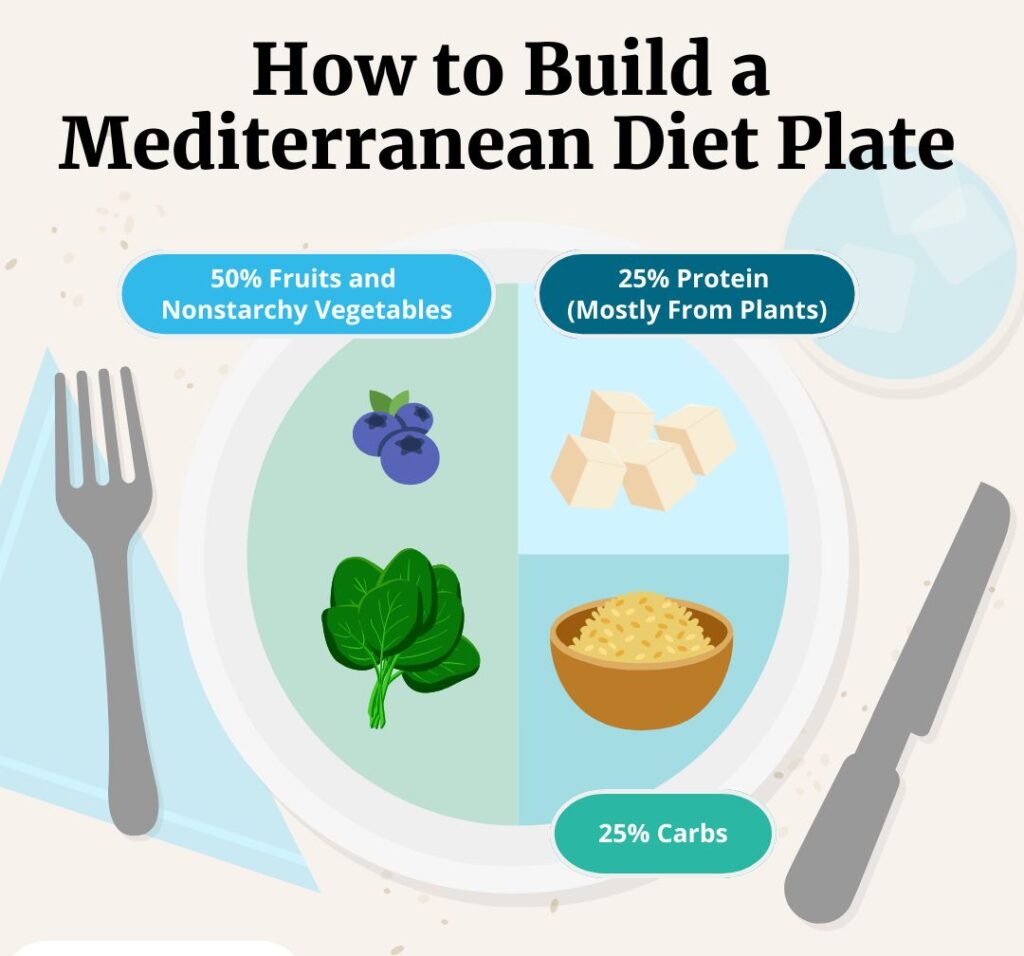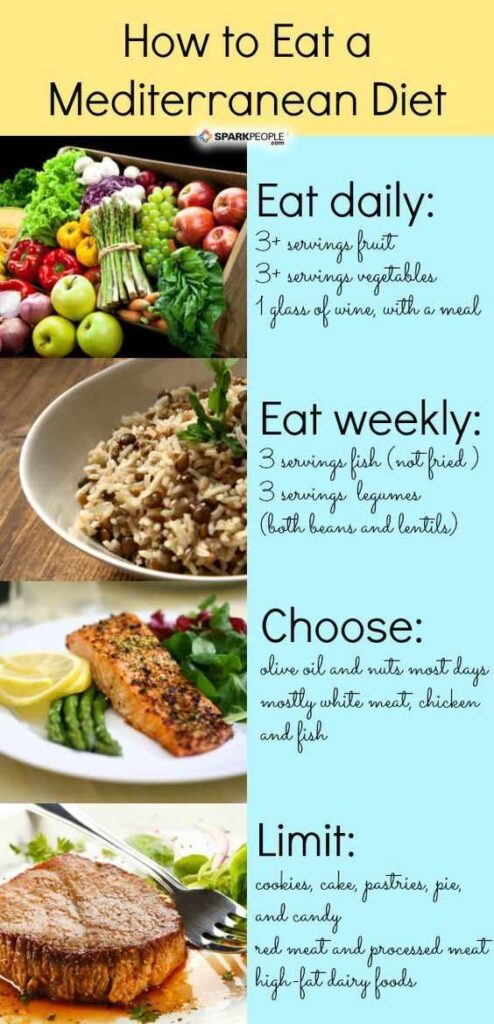How to start a Mediterranean diet involves embracing a variety of fresh, wholesome foods. Begin by incorporating plenty of fruits and vegetables into your meals, focusing on seasonal and local options.

Whole grains, such as brown rice and whole wheat bread, should be staples in your diet, while healthy fats like olive oil and nuts replace saturated fats. Lean proteins, particularly fish and legumes, are essential, and red meat should be consumed sparingly.
Additionally, make mealtime a social event by enjoying food with family and friends, as this communal aspect is a hallmark of the Mediterranean lifestyle. Following these steps will help you easily adopt this flavorful and healthful way of eating.
What Is the Mediterranean Diet and How to start?
The Mediterranean Diet is based on the traditional foods and cooking styles of countries bordering the Mediterranean Sea, including Greece, Italy, Spain, and southern France. It’s not a strict meal plan but rather a way of eating that emphasizes whole, natural foods. This diet is rich in plant-based ingredients like fruits, vegetables, legumes, and whole grains, along with healthy fats, especially from olive oil.

Unlike restrictive diets that cut out entire food groups, the Mediterranean Diet is flexible and focuses on balance. It encourages eating a variety of foods in moderation, allowing you to enjoy delicious meals while still promoting long-term health benefits.
Key Components to start a Your Diet
Here’s a breakdown of the key components that make up the Mediterranean Diet:

- Fruits and Vegetables: A significant portion of your plate should be filled with colorful, seasonal fruits and vegetables. These provide essential vitamins, minerals, and antioxidants that promote overall health.
- Whole Grains: Instead of refined grains, the Mediterranean Diet promotes the consumption of whole grains like quinoa, barley, and whole wheat bread. These grains are rich in fiber, which aids digestion and helps with weight management.
- Healthy Fats: Olive oil is a cornerstone of the Mediterranean Diet and is used as the primary source of fat. Rich in monounsaturated fats, olive oil can improve cholesterol levels and support heart health. Other healthy fats come from sources like avocados, nuts, and seeds.
- Lean Proteins: While the Mediterranean Diet is plant-based, it also includes moderate amounts of lean proteins, particularly from fish and seafood. Oily fish like salmon, sardines, and mackerel are rich in omega-3 fatty acids, which have been linked to improved heart and brain health. Poultry and eggs are consumed in smaller amounts, while red meat is limited.
- Dairy: Dairy is consumed in moderation, mainly in the form of yogurt and cheese. Greek yogurt, in particular, is popular for its high protein content and probiotics, which support gut health.
- Legumes: Beans, lentils, and chickpeas are commonly consumed in the Mediterranean Diet. They provide plant-based protein, fiber, and various micronutrients that support a healthy body.
- Herbs and Spices: Instead of relying on salt to flavor foods, the Mediterranean Diet encourages the use of herbs and spices like basil, oregano, and garlic. These add depth to dishes and offer additional health benefits through their antioxidant properties.
- Wine in Moderation: Red wine is often enjoyed in moderation with meals, as it contains resveratrol, a compound that has been associated with heart health. However, it’s essential to keep alcohol consumption within recommended limits to avoid negative health impacts.
Health Benefits of the Mediterranean Diet
One of the reasons why the Mediterranean Diet is so popular is because of its proven health benefits. Numerous studies have shown that following this diet can lead to a variety of positive outcomes:
1. Heart Health
The Mediterranean Diet is often praised for its heart-healthy properties. The combination of healthy fats from olive oil, omega-3s from fish, and high fiber from whole grains helps reduce the risk of heart disease. Studies suggest that people who follow this diet have a lower chance of developing cardiovascular problems, such as heart attacks and strokes.
2. Weight Management
While the Mediterranean Diet isn’t necessarily a weight-loss plan, many people find it easier to maintain a healthy weight while following this eating style. The focus on nutrient-dense, whole foods means you’re less likely to overeat or consume empty calories. The high fiber content also keeps you feeling fuller for longer, helping with portion control.
3. Lower Risk of Type 2 Diabetes
Because the Mediterranean Diet is low in processed sugars and refined carbohydrates, it can help regulate blood sugar levels. This, in turn, reduces the risk of developing type 2 diabetes. The inclusion of whole grains, legumes, and healthy fats helps stabilize blood glucose and insulin levels.
4. Brain Health
Emerging research suggests that the Mediterranean Diet may also support cognitive health. The high intake of antioxidants, healthy fats, and omega-3s has been linked to a reduced risk of cognitive decline and Alzheimer’s disease. The diet’s emphasis on anti-inflammatory foods may protect brain cells from damage.
5. Longevity
People in Mediterranean countries have some of the highest life expectancies in the world. This longevity has been attributed to their diet, which is rich in heart-healthy fats, antioxidants, and anti-inflammatory foods. Adopting the Mediterranean Diet could increase your chances of living a longer, healthier life.
How to Start Your Diet
If you’re ready, here are a few tips on How to Start a Mediterranean Diet

1. Start with Olive Oil
Replace butter and other unhealthy fats in your cooking with extra virgin olive oil. Use it to sauté vegetables, drizzle over salads, or as a dip for whole-grain bread.
2. Eat More Fish
Try to include fish in your meals at least twice a week. Grilled salmon, sardines, or even a tuna salad can provide a good dose of heart-healthy omega-3s.
3. Fill Your Plate with Vegetables
Make half of your plate vegetables. Focus on seasonal, colorful produce like spinach, tomatoes, zucchini, and eggplant to create delicious and nutrient-dense meals.
4. Enjoy Whole Grains
Swap out white bread, pasta, and rice for whole-grain alternatives. Think whole-wheat pasta, brown rice, and farro to boost your fiber intake.
5. Snack on Nuts and Seeds
Instead of processed snacks, reach for a handful of almonds, walnuts, or sunflower seeds. These are excellent sources of healthy fats, protein, and fiber.
6. Savor Your Meals
One of the core principles of the Mediterranean Diet is enjoying your food. Take time to savor each bite, and make meals a time to connect with friends and family.
Sample Mediterranean Diet Meal Plan to start Your Diet
Here’s a sample day on the Mediterranean Diet to give you a sense of how delicious and varied the meals can be:
- Breakfast: Greek yogurt topped with fresh berries, a drizzle of honey, and a sprinkle of chia seeds.
- Lunch: A salad with mixed greens, cherry tomatoes, cucumbers, olives, feta cheese, and grilled chicken, drizzled with olive oil and lemon juice.
- Snack: A handful of almonds and an apple.
- Dinner: Grilled salmon served with quinoa and roasted vegetables, like zucchini and bell peppers.
- Dessert: A small serving of fresh fruit, such as figs or grapes, with a glass of red wine (optional).
Final Thoughts
The Mediterranean Diet is more than just a way of eating – it’s a lifestyle that promotes overall well-being. With its focus on fresh, whole foods and an emphasis on healthy fats, lean proteins, and plant-based ingredients, it’s no surprise that this diet has been linked to so many health benefits.
Whether you’re looking to improve your heart health, manage your weight, or simply enjoy a flavorful and nutritious way of eating, the Mediterranean Diet is worth trying.
